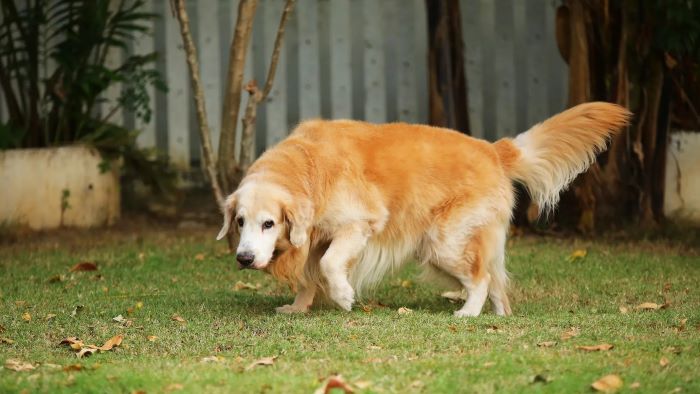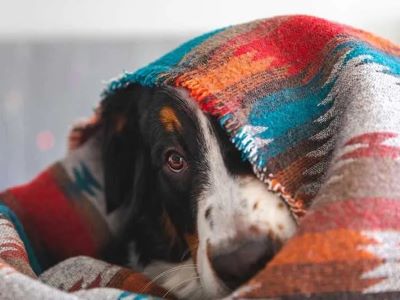Taking care of a senior dog is not as easy as it seems. Senior dogs are as it is prone to illness and some might them might be serious too. It is really difficult to figure out what is wrong with your senior dog and if your senior dog is pacing then you might think, “My senior dog is pacing and won’t lie down” What’s wrong?
Through our blog, we will try to provide you with all the required information which will help you figure out what’s wrong.

My Senior Dog Is Pacing and Won’t Lie Down
If your senior dog[1] is pacing then the following can be the reasons for it:
Heath factors
Here are the health-related factors that are responsible for your senior dog’s sudden pacing:
Cognitive dysfunction: This cognitive dysfunction affects the dog’s neurological system directly. It makes the dog confused and leads to disorientation and pacing. You might even notice that the dogs suffering from this cognitive dysfunction show repetitive behaviour all of a sudden.
Pain: Discomfort and pain too can make your senior dog pace around continuously. Senior dogs tend to suffer from illnesses like arthritis and are easily prone to get injured as their bones get weak. This illness and injury can cause pain and make them pace around in pain.
Vision loss: Just like humans dogs suffer from vision loss as they start to grow old. A senior dog is likely to develop cataracts and suffer from eyesight-related issues. Due to loss of vision, the dog might be confused and pace around.
Hearing loss: senior dogs suffering from hearing loss can pace around repeatedly. Loss of hearing can make the dog anxious. If you have noticed the dog then you might also have noticed how the dog has the habit of reacting to the sounds. Suddenly the inability to not hear the sound makes the dog nervous and restless.
Neurological disorder: The dog’s brain gets affected by the neurological disorders. These neurological disorders such as tumours, and strokes leave the senior dog in misery and pain.
Gastrointestinal issues: Gastrointestinal issues like constipation, gastritis, bloating and vomiting can lead to restlessness in dogs. These gastrointestinal issues are the result of a lack of digestion and improper diet of the dog.
Cardiac issues: Heart issues in dogs can decrease their stamina, making them tired easily. These cardiac issues can make it difficult for the dog to breathe and as a result, they tend to pace.
Respiratory issues: If your dog is pacing around more than usual then it can be due to a respiratory illness. Respiratory issues like bronchitis and pneumonia make it difficult for the dog to breathe and thus make the dog uncomfortable.

Environmental factors
Here are the environmental factors that are responsible for your senior dog’s sudden pacing:
- Change in temperature can also make the dog pace. In summer the temperature reaches an extreme level which makes the senior dogs restless and they seek for resting spot and keep on changing it frequently.
- Change in surroundings too leads to dog pacing. When a dog is a habitat to live in one place then the sudden shift can make them restless and they happen to pace around continuously without lying down.
- Senior dogs are more prone to stay in one place and their activity too is restricted, which makes them lazy and isolated. Due to a lack of physical stimulation, they have difficulty performing daily tasks which makes them restless.
- Apart from all these above factors noise in the surroundings too can make your senior dog pace around. Sounds like fireworks, thunderstorms or loud music can make the dog anxious and stressed out.
When To Worry About Your Senior Dog’s Pacing
Here’s when you need to worry about your senior dog’s pacing:
- If you notice sudden and frequent pacing in dogs then you might need to see the vet as soon as possible.
- Whining or limping along with the pacing and restlessness.
- Difficulty in breathing and panting excessively.
- Gastrointestinal issues like vomiting, diarrhoea, and abdominal pain in dogs.
- Anxiety and extreme stress in dogs.
- Neurological issues like seizures, frequent painting, distractions or loss of consciousness in dogs.
How To Prevent Pacing in Senior Dogs

Here are ways to prevent pacing in senior dogs:
- Regular veterinary check-up helps to know the illness or any other sort of discomfort of the dog beforehand. Through these regular check-up, serious health issues can be prevented.
As mentioned by Brittany Kleszynski, DVM in petmd, “Twice-yearly veterinary checkups are essential for senior pets. Because their health status can change rapidly, it is important for a veterinarian to assess your pet every six months.”
- Make sure you create a safe and secure space for your senior dog. The place where they can seek comfort without any sort of discomfort due to noises, or any other distraction.
- Sometimes temperature too affects the dog, so make sure the room temperature of your dog’s place is moderate.
- Senior dogs are restricted from performing the physical stimulation but there is no restriction on mental stimulation. Make sure you keep your senior dog equipped with mental activities which will not make them anxious and bored.
- Provide your dog with a properly balanced diet, the food you serve your dog should meet their nutritional need. The dog’s diet should change according to their age and requirements, and for that, you can take the help of the vet.
FAQs
My senior dog is pacing and won’t lie down
Your senior dog is likely to pace if he is uncomfortable or nervous. Anxiety, arthritis, discomfort, or even cognitive dysfunction a condition that reflects dementia in humans can all be indicated by pacing and an inability to lie down. It’s important to see if any more symptoms develop that could point to the main reason.
How do you calm a pacing dog?
Behavioural training, change in the environment, and even medical intervention are used to calm a pacing dog, depending on the underlying reason for the pacing. Make sure that your senior dog has a peaceful, cosy area to relax. Anxiety can be reduced by having soft bedding and peaceful surroundings.
How do you get a restless dog to sleep?
While it might be difficult to help a restless dog go to sleep, there are a few methods that you can try to encourage a restful night’s sleep. It’s crucial to see a vet to rule out any health issues if your dog is becoming restless in an unfamiliar way or if you think it may be related to a medical condition.
Why is my senior dog hiding and acting strange?
Many factors, from health problems to changes in the environment or behaviour, may be at play when an elderly dog begins to hide and behave abnormally. When they are ill or hurt, dogs may hide. When a dog is ill, it is their natural tendency to go for a quiet, safe place.
How do I know if my senior dog is depressed?
Understanding depression in older dogs requires noticing changes in their typical behaviour. Dogs who are sad can seem disinterested in things they used to love, such as playing or going for walks.
Conclusion
We hope through our blog, “My senior dog is pacing and won’t lie down” we have provided you with all the necessary details. So now if your senior dog paces you will be well aware and prepared to deal with this. Being a responsible pet parent it’s your duty to ensure your pet’s safety, especially in their old age.
In our blog, we have also guided you with the solution to stop the pacing of your senior dog. If the above-mentioned methods too fail to provide your senior dog relief then it is advisable to consult a vet immediately.
Reference:
- Behavior problems in older dogs. (n.d.). ASPCA.



